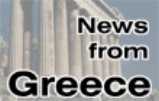Anti-Jewish attacks
While poorly covered in the media, anti-Jewish acts are on the rise. The Nikaia cemetery in Piraeus was the most recent victim on Friday, 26 May. Nazi slogans were painted on more than 90 gravestones at Nikaia, the country's largest Jewish burial ground.
It was merely the latest in a series of attacks in the past month that have targeted Greece's Holocaust memorial, a synagogue in Thessaloniki and the house of film director Jules Dassin, who is of Jewish descent.
While no group has yet claimed responsibility for the attacks, graffiti in the Thessaloniki incident included the name Hrisi Avgi (Golden Dawn), a Greek fascist organisation.
Moses Constantini, president of the Central Board of Jewish Communities, condemned the attack and government inaction on similar incidents, saying "I am sorry to say that the government did not react to past incidences of vandalism. Now, it will have to react."
Government spokesman Dimitris Reppas condemned the attacks, saying those responsible for the acts of desecration would be punished.
Nevertheless, Greek governments have in the past seemed reluctant or unable to take action to prevent or punish similar behaviour.
In 1998, Golden Dawn members attacked a student while nearby police did nothing to stop the assault. Although the culprits were known to the police, no arrests have yet been made.
Extremist fascist action is a sporadic phenomenon in Greek society and seldom raises serious concerns.
New ID cards still controversial
Prime Minister Constantine Simitis' decision to strike religious affiliation from the new police identification cards carried by all Greek citizens continued to dominate public life this week.
Opposition leader and president of the New Democracy party (Nea Dimocratia) Constantine Karamanlis accused the government of trying to open a rift with the Orthodox Church and again advocated dialogue on the issue.
Meanwhile, moderates and extremists within the Church itself seemed to be divided over the issue. On Sunday, 28 May, Archbishop of Athens and All Greece Christodoulos called upon the clergy and the faithful to start a struggle to defend Orthodoxy and the Church, but by the end of the week he was trying to distance himself from extremists, who include para-ecclesiastical groups and certain members of the clergy.
On Wednesday, 31 May, 8000 people, including clergy members, demonstrated in central Athens against the new ID cards, but also against Satan, Jews, Freemasons, the Schengen Treaty and the sign "666."
Fearing that such extremism would undermine the Church's position and push the Greek public into the government's corner, Archbishop Christodoulos tried to distance himself from similar actions and portrayed himself as a moderate on the question.
Nevertheless, he said that the Church "says 'yes' to negotiations, but 'no' to compromise," and added that if there were to be a referendum on the new cards, 90 percent of the Greek people would side with the Church.
Prime Minister Simitis has ruled out a referendum and obviously considers the issue to be closed.
Prez visits Canada
President of the Republic Costis Stephanopoulos concluded a week-long official visit to Canada on Friday, 2 June. In talks with Canadian Prime Minister Jean Chrétien, Stephanopoulos registered Greek concerns over the possible construction of a nuclear energy plant in Akuyu, Turkey, based on Canadian nuclear technology.
Greek delegation visits Albania
At the invitation of local authorities, a delegation from the Greek embassy in Tirana accompanied Greek bankers and members of the Greek-Albanian Chamber on a visit to Berat on Saturday, 27 May.
The delegation held talks with local politicians and business owners focusing on possible investment in a variety of sectors in the region, including tourism and the production of olive oil, fruit, tobacco, wood products and construction materials.
The delegation was headed by Alexandros Mallias, Greece's ambassador to Tirana, who noted that Greek investment in Albania will double over the 2000-2001 fiscal year through both direct and joint ventures.
Energy conference aims to form SEE market
In Athens on Friday, energy ministers from Albania, Bulgaria, Bosnia-Hercegovina, Romania and Macedonia signed a memorandum aiming to form a competitive regional energy market in Southeastern Europe. The agreement was inked on the final day of a two-day energy conference that promoted cooperation on energy issues between European Union, Black Sea and Mediterranean states.
Greek role in a "federalised Europe"?
Prime Minister Simitis is representing Greece at a three-day meeting of centre-left political leaders that began on Friday, 2 June in Berlin. Local commentators believe that this could represent a turning point in Greece's role in Europe as the EU debates federalisation.
After just recently securing participation in the European Monetary Union, Greece is faced with a new dilemma: whether to take the next big step by participating in a more powerful political and economic international formation, the "hard core" of a federalised Europe.
Some commentators feel that if Greece does not consider participation in a future federalised Europe, it will remain stuck in "second or even third gear" and risk the loss of almost half the profits gained from its long quest to gain admission to the EMU.
More earthquakes
Greece was again hit by an earthquake on Saturday, 27 May. The quake, which registered 4.7 on the Richter scale, hit the Peloponnese peninsula near Kalamata and was the fourth in seven days.
Seismologists, though, say there is little to worry about. They believe Saturday's quake was merely an aftershock of one measuring 5.3 on the Richter scale that hit the town of Preveza on Friday, 26 May.
Meanwhile, investigators in the town said the quake damaged dozens of homes, whose residents are now sheltered in temporary shelters and with other local families.
Maria Vidali, 3 May 2000
Moving on:
Sources:
Kathimerini in Greek
Kathimerini in English
Eleftherotypia Online
Athens News Agency
ERA ENA (state radio)
London Greek Radio
London Greek Radio Online



